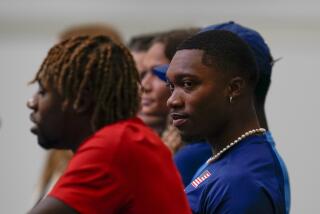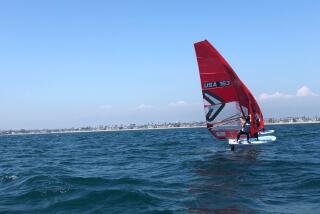Bertrand, Aussie Skipper, Won’t Sail Again for America’s Cup
- Share via
OSTERVILLE, Mass. — John Bertrand, the Australian helmsman who wrenched the America’s Cup away from the United States two years ago, is a champion with a new mission.
Instead of mastering his country’s upcoming defense from an international field of competitors off Fremantle, Australia, Bertrand is transferring all he has learned about winning match races to generating corporate success for Australian business people.
“To ask me to compete once more in the America’s Cup would be like asking Sir Edmund Hillary to climb Mount Everest again,” Bertrand said. “Now there are other challenges.”
But after 14 grueling years with only one goal in sight--seizing the symbol of yachting supremacy from the Americans--Bertrand said helping his countrymen keep the “auld mug” at the Royal Perth Yacht Club where it resides in splendor is a lifetime priority he cannot ignore.
Relaxing on Cape Cod, not far from Newport, R.I., where Australia II fought her way back from seemingly certain defeat by Dennis Conner in 1983, Bertrand talked about his role in crew training, boat tuning and preparations for Alan Bond’s first cup defense. But he will not be the skipper.
When Conner’s red-hulled 12-meter yacht, Liberty, lost, the longest winning streak in the history of sports competition was broken. The United States and the New York Yacht Club had a 132-year stranglehold on the America’s Cup.
Four syndicates in Australia are contending for the right to defend the prize won by Bertrand’s crew in the mammoth and costly effort financed by Perth businessman Bond.
The feisty Bond is back in contention again, with his Defense Syndicate featuring Australia III and IV, and so is Ben Lexcen, the designer who created the revolutionary winged keel.
“It wasn’t an easy decision” to give up the skipper’s mantle, Bertrand said.
But in evaluating the years from 1969 when he began his quest as the port trimmer on Gretel II, Bertrand said, “I was there only to win. The only reason I ever sailed at Newport was to win the America’s Cup. I always believed it could be done.
“To keep going with the physical and mental demands of racing 12-meters, I’d have to be willing to sweat blood and put my body and life on the line.
“So I asked myself, ‘How many times do you need to climb a mountain?’ and realized I need to grow as a person.”
At 38, Bertrand said he is finding new fulfillment as director of Ansett Energy, a venture backed by business magnates Rupert Murdoch and Sir Peter Ables.
While marketing new technology in energy systems, Bertrand is also delighted with the demand for seminars he conducts in Australia for business people intrigued by his observations about motivation, preparation, psychological warfare and not giving up.
Although Bertrand holds a masters degree in marine engineering from the Massachusetts Institute of Technology, set up his own franchise of North Sails in Australia and authored “Born To Win” about his struggle to win the cup, the ambitious Aussie regards as his primary business asset the “street smarts” he developed over years of racing Twelves.
“Whether you’re down by an overwhelming 3-1 in a race or trying to keep a company in trouble alive, the stress control aspect is essential,” Bertrand said referring to Conner’s overwhelming lead after four races. “People can work effectively under high stress conditions and can be motivated if they are not overwhelmed by the consequences.
“When things looked impossible, when Dennis needed to win only one more race to send us home to Australia, I didn’t talk about the insurmountable odds or the incredible difficulty of winning three in a row (in the best of seven series). I said, ‘Go out and win today. Do the job you are trained to do.’
“People cannot perform when they become confused by too many guidelines,” Bertrand said. “Make it simple.
“This applies in business as well. Those who have the mental discipline to set down simple goals for others in times of stress are the most successful.”
Bertrand never underestimates team spirit.
“In every walk of life, a tightly-grouped, determined, well-trained team will so often overcome pure genius.”
It was Lexcen’s keel, shrouded in secrecy, that provided the most crucial element of psychological warfare, Bertrand said, and the success of the breakthrough has changed the competition “for the better.”
While Bertrand praised Lexcen’s genius in producing a keel that enhanced maneuverability, he said its primary advantage was as an instrument “of pure intimidation.”
Covering the keel every time Australia II came out of the water and talking guardedly about it produced “paranoia” about the boat, Bertrand said.
“Our strategy was to ensure that the myth of Australia II as unbeatable caused Dennis’ concern to become progressively worse,” Bertrand said.
“I am sure if we had never bothered to hide what we had, our opponents would have been far less nervous.”
Keel shrouding has now become the tactic for the next race in the rough seas off Western Australia in January, 1987. With 16 challengers from six countries trying to come up with an unbeatable technological marvel and almost all refusing to unveil their designs, Bertrand predicted a race “with even more intrigue and mystique.”
He views all the furtiveness as “part of the fun and healthy for the sport.”
“If you want to make someone very, very nervous, the first thing you want to convey is mystery,” Bertrand observed. “There is nothing quite as worrisome as not knowing what you are trying to defeat.”
Among the American challengers, Bertrand regards Conner as among the most formidable because of his all-encompassing desire to win back the trophy he lost.
Bertrand said he is also very impressed by America II skipper John Kolius, who distinguished himself in Newport by giving Conner a tough fight for the defender’s spot.
Kolius does not have Conner’s experience, Bertrand said, but he may “be a more naturally gifted yachtsman.”
While Conner was very disturbed by the keel’s possibilities, Bertrand recalled Kolius “was nowhere nearly as intimidated.”
“I like Kolius’ crew-oriented spirit,” Bertrand said. “He’s a people’s man on and off the water” whereas Conner tends to separate from the crew once on shore.
Bertrand also sees the Australia II victory as a psychological boost for the other competing foreigners, including New Zealand, Canada, Italy and France.
“All of these participants must be thinking, ‘If Australia can do it, why can’t we?”’
With cup fever starting to boil again in anticipation of Australia’s first defense, Bertrand said he is worried about the quality of Bond’s competition for the right to defend.
Bond has even loaned Lexcen to another syndicate, and Lexcen has designed another yacht for that group.
Perth millionaire Kevin Perry and the Task Force ’87 Syndicate have their yacht, Kookaburra, in the water and the fourth syndicate, the Eastern Australian Defense, is sailing Bond’s Australia I.
“We have the hometown advantage,” Bertrand said. “For the first time we’re not conducting a campaign halfway around the world.
“But we haven’t raced off Fremantle either, and we don’t know the idiosyncrasies of the weather there.”
All of the competitors will be sailing a new course. Instead of the six-leg Olympic course, the Royal Perth Yacht Club has shortened the length of each leg and two more legs, one windward and one leeward, have been added.
While the traditional 24.3-mile distance has been maintained, the new course will put a premium on crew training and stamina since there will be more tacking, marks to round and less time to prepare for them.
Asked if he could resist the temptation to take the helm once again if the state of patriotic euphoria sparked by Australia’s victory appears to be seriously threatened, Bertrand paused and then said thoughtfully, “I don’t think there is any way I can return.
“I’d have to be out there practicing now, and I’m not, and I’d have to be burning with a desire I don’t have.”
Watching his wife, Raza, and their three children dashing along the beach, Bertrand said, “I’m leading a very balanced life. Winning the America’s Cup gave me opportunities I didn’t have before, and I want to explore them.”
Aware that his decision not to race again ensures his status as the hero who broke the longest winning streak will not be tarnished by a loss, Bertrand said, “I’ve gotten used to that. After all, I prepared for 14 years.”
More to Read
Sign up for Essential California
The most important California stories and recommendations in your inbox every morning.
You may occasionally receive promotional content from the Los Angeles Times.













